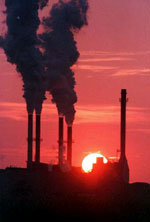 Two days before the Intergovernmental Panel on Climate Change (IPCC) was to officially release its much-expected report in Paris on the human impact on the environment and global warming, Taiwan was sent a strong reminder from China that pollution knows no borders, makes no distinction between rich and poor, young and the elderly, and is a threat to all. That reminder came on the back of a cold front coming from China, which with it carried diverse forms of aerosolized industrial chemicals from China’s industrial coastline. Particulate and sulfur dioxide levels were at such levels that the Environment Protection Administration advised people with cardiovascular or respiratory diseases to stay indoors.
Two days before the Intergovernmental Panel on Climate Change (IPCC) was to officially release its much-expected report in Paris on the human impact on the environment and global warming, Taiwan was sent a strong reminder from China that pollution knows no borders, makes no distinction between rich and poor, young and the elderly, and is a threat to all. That reminder came on the back of a cold front coming from China, which with it carried diverse forms of aerosolized industrial chemicals from China’s industrial coastline. Particulate and sulfur dioxide levels were at such levels that the Environment Protection Administration advised people with cardiovascular or respiratory diseases to stay indoors.Conditions in Taipei City were not as severe as other areas in Taiwan, and yet, when I looked out the window yesterday morning, the effects of that pollution were visible to the naked eye: the apartment where I live is located less than a kilometer from the Taipei 101 building. On any given day, it is perfectly visible. But for a while yesterday the sky had a gray, steel tinge to it and the world’s tallest occupied freestanding structure was hiding behind the veil of atmospheric pollution. Ten in the morning had the light quality of a strange dawn.
Then, as I stepped outside, I fully understood why the EPA had made an advisory targeting people with respiratory or cardiovascular problems: a mere 20-minute walk left fighting for air, and my nose was clogged. All around me, people were sneezing, most of them behind the protective masks so prevalent in East Asia. As there is no alternative to breathing, one has little choice but to take in the foul-smelling oxygen, knowing full well that this implies breathing in some chemicals as well. The most astonishing thing was that a large part of those pollutants, this vaporized industrial waste, had not even originated in Taiwan proper, but in China, more than 100km away across the Taiwan Strait.
The problem of pollution is far worse in China, where environmental regulations are at best nominal only and in most cases inexistent. According to the Guardian, air pollution is responsible for 400,000 premature deaths in China every year. Every year, thousands upon thousands of people die prematurely as a result, and many children are born with respiratory and allergy problems at a prevalence historically unseen. A Chinese government study conducted in 2003 revealed that more than 100 million Chinese lived in cities where the air quality was considered “very dangerous.”
A small reminder after a walk that left me breathless, eyes itchy and nose runny, that whatever the IPCC reveals in its report on Friday, we should take seriously. If the world continues to pollute at the current rate and if its governments continue to see the Kyoto Protocol as a sound bite — if not an object of contempt, as Canadian Prime Minister Stephen Harper seems to — rather than an obligation to generations present and future, then it can only get worse and other landmarks will begin to disappear, in some areas perhaps for good.
Which brings me to my last point: whether it is true or not that the Harper government played a hand in the sacking of Canadian Environment Commissioner Johanne Gelinas, there is no such thing as being too tireless, or showing too much dedication, in promoting environmental protection.

No comments:
Post a Comment